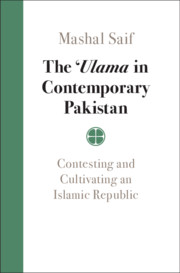Book contents
- The ‘Ulama in Contemporary Pakistan
- The ‘Ulama in Contemporary Pakistan
- Copyright page
- Dedication
- Contents
- Acknowledgments
- Note on Translation and Transliteration
- Introduction
- 1 The Clerics and the Council
- 2 Sovereignty between God and the State
- 3 Questioning State Identity and Legitimacy
- 4 Seeking Security
- 5 Minority Aspirations and the State
- Conclusion
- Bibliography
- Index
Introduction
Published online by Cambridge University Press: 20 October 2020
- The ‘Ulama in Contemporary Pakistan
- The ‘Ulama in Contemporary Pakistan
- Copyright page
- Dedication
- Contents
- Acknowledgments
- Note on Translation and Transliteration
- Introduction
- 1 The Clerics and the Council
- 2 Sovereignty between God and the State
- 3 Questioning State Identity and Legitimacy
- 4 Seeking Security
- 5 Minority Aspirations and the State
- Conclusion
- Bibliography
- Index
Summary
It was early July 2007 and Pakistan’s capital city Islamabad was in uproar. Armed military personnel lined the streets in a face-off with students and faculty of the Red Mosque (Lal Masjid) complex, a compound housing the Red Mosque and a women’s religious seminary (madrasa); the affiliated men’s seminary is a short drive from the compound. This unusual situation had some precedent. The seminaries’ leaders, brothers ‘Abd al-‘Aziz and ‘Abd al-Rashid often entered into disputes with the government. Until summer 2007 the altercations had been largely verbal: The mosque and seminary affiliates had a history of publicly condemning the state and its policies as un-Islamic. At times the critique was justified through meticulous religious reasoning. ‘Abd al-‘Aziz, the older of the two brothers, had trained extensively at the famous seminary Jami‘at al-‘Ulum al-Islamiyya in Karachi. Some years earlier ‘Abd al-‘Aziz, drawing on his study of Islamic law, had issued a religious decree declaring the state’s battle against the terrorist groups al-Qa‘ida and the Taliban as un-Islamic.2
- Type
- Chapter
- Information
- The 'Ulama in Contemporary PakistanContesting and Cultivating an Islamic Republic, pp. 1 - 36Publisher: Cambridge University PressPrint publication year: 2020

